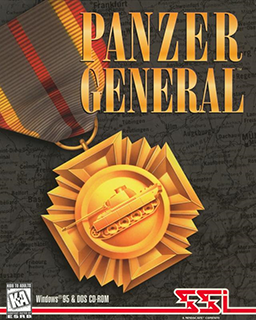Panzer General
| Panzer General | |
|---|---|
 |
|
| Developer(s) | Strategic Simulations |
| Publisher(s) | Strategic Simulations |
| Platform(s) | MS-DOS, 3DO, Mac OS 7, PlayStation, Windows |
| Release | 1994 |
| Genre(s) | Turn-based strategy |
| Mode(s) | Single player or two player via hotseat or PBEM |
| Review scores | |
|---|---|
| Publication | Score |
| CGW | |
| EGM | 7.125 / 10 (3DO) |
| Next Generation |
|
Panzer General is a computer wargame published by Strategic Simulations in 1994 and set in World War II.
Panzer General is a turn-based game, set on operational level hex maps. One plays lone scenarios from either Axis or Allied side and against a computer or human opponent. In Campaign Mode, the player assumes the role of a German Generalissimus against the Allied computer.
Panzer General is an operational-level game, and units approximate battalions, although unit size and map scale from one scenario to the next are elastic. While the names and information for the units are reasonably accurate, the scenarios only approximate historical situations.
Its novel feature was to link individual scenarios into a campaign spanning World War II from 1939 to 1945. Units are able to gain experience and become stronger, where success in one battle would award the player prestige to upgrade units, acquire additional units, and select a better scenario for the next battle.
In 1996, Panzer General won the Origins Award for Best Military or Strategy Computer Game of 1995. The game and its sequels spawned a loyal following, who have revived online head-to-head play and added many units, features, and over 2,500 scenarios. New ideas are still being developed two decades after its initial release.
Panzer General has 38 scenarios based on real or fictitious battles from World War II. The player can engage in a single battle or a campaign mode.
In Campaign Mode, a series of battles unfolds as a campaign heads to victory. There is one long campaign as Germany, with five starting locales:
The task in most scenarios is to take all objective cities in a given number of turns; taking them at least 5 turns earlier is considered a major victory. In scenarios from later stages of war, the Germans try to hold positions against a stronger enemy. A typical task is then "hold at least two of our objective cities for 20 turns; for major victory, hold at least five."
...
Wikipedia
